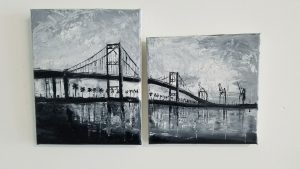Christina Soto van der Plas
Second Project Fellow in Residence, Winter 2019
Christina’s Stats:
Department: Hispanic Studies
Rank: Assistant Professor
Years at UCR: 2 years
Favorite thing: Sitting on a bench, painting the beautiful and chaotic scenery of the Port of Los Angeles at San Pedro.
Top three texts to take to a desert island:
❖ The three volumes of Ricardo Piglia’s diaries which he published under the name of his alter-ego, Los diarios de Emilio Renzi.
❖ The Odyssey, of course, because I would be stranded in an island.
❖ The psychoanalyst Jacques Lacan’s Seminar 20: Encore, a beautiful reflection on love and sex.
Q. Summarize your research in one sentence…
I draw ideas from intuitions and fascinating patterns in literary or theoretical works and then fashion daring and seemingly weird hypothesis on a corpus of my choosing to rethink how our imaginaries and language structure our experience.
Q. How do you feel that your work differs from other scholars?
My research is unique because of its ability to create terms and definitions drawn from literature to rethink and shift the paradigms of my discipline (Latin American Literature), cutting across boundaries and crossing divisions. The underlying assumption of my research within contemporary Mexican and Latin American studies is that literature can not only be thought, but it is also a form of thought, thus bridging and traversing many of the impasses and divisions that have dominated much of literary criticism.
Q: What are you working on this quarter?
My new project Is about what I call the “New Chronicles of the Indies”. The project seeks to question the ideas of the three terms I chose as a title: “new,” “chronicles,” and “Indies”. It explores how the traditional chronicles of the discovery and conquering of the Americas have been rewritten or reformulated with different purposes and in different literary forms. I find logics and literary procedures more than themes or relationships with a historical setting. One of the overarching hypotheses of the project is that the chronicle is the literary genre that founded modernity in its speculative projections and exchanges of geography and economy.
Q: Anything else new and exciting in your world?
*I just came back from a trip to Mexico City where I was a keynote speaker for the first time! The talk was at my alma mater the Universidad Iberoamericana, where I studied my licenciatura (BA). Going back home, after seven years, and achieving all that I have was an amazing moment for me. One of the last essays I wrote, about the Mexican poet José Emilio Pacheco, can be found in the book Mexican Literature in Theory (Bloomsbury, 2018). I am also writing a chronicle about San Andrea’s Fault and the Salton Sea.
Q: How do you share your research with students and in your courses?
Two crucial verbs have always expressed what I am most passionate about: reading and writing. But now that I am a professor, I have permanently added a third verb to the list: teaching. And it is the perfect complement of the other verbs because the solitary acts of reading and writing are now supplemented with the opportunity to share and instill what I love about them. In my classroom you will often find a blackboard full of words, diagrams, arrows, and drawings of my students’ ideas that, together, we manage to connect by drawing constellations or categories for better understanding a text. I encourage students to think outside the box and pursue “strange” ideas that touch upon our lives.
Learn more or get in touch with Christina: ucriverside.academia.edu/ChristinaSotovanderPlas
❖
In Focus is a new interview series that features faculty associates of the Center for Ideas and Society.

